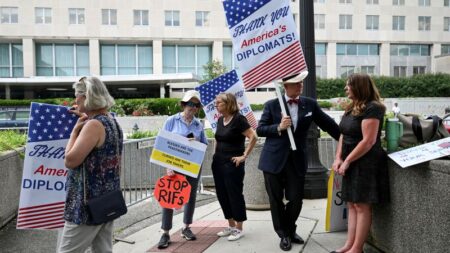On a notable Friday, a federal judge ruled against the Department of Homeland Security (DHS) regarding immigration raids in Los Angeles, stating that the department had conducted stops and made arrests without probable cause. This ruling requires the DHS to cease detaining individuals based solely on factors such as race, spoken language, or occupation. The decision was made by US District Judge Maame Ewusi-Mensah Frimpong, an appointee of former President Joe Biden, highlighting a significant intervention in the immigration enforcement policies that have been a topic of heated debate in the United States.
Judge Frimpong’s order mandates that the DHS must create specific guidelines for its officers to ascertain “reasonable suspicion,” which must extend beyond superficial attributes like the race or ethnicity of a person, the language they speak or their accent, where they are located, such as bus stops, or their job. This ruling reinforces the legal principle that individuals should not be discriminated against based on arbitrary characteristics devoid of legitimate suspicion of illegal activity.
The ruling followed a lawsuit filed by the American Civil Liberties Union (ACLU) of Southern California against the former Trump administration. The case was brought forward last week by the ACLU on behalf of five individuals alongside immigration advocacy organizations. They alleged that the DHS, which oversees Immigration and Customs Enforcement (ICE), was making arrests that violated constitutional rights. The timing of the lawsuit being filed right before this rousing decision reflects ongoing challenges and critiques regarding the nature of immigration enforcement practices in the U.S.
In his ruling, Judge Frimpong expressed that the DHS administration had failed to adequately explain the rationale behind the arrests made during these immigration raids. Frimpong remarked that the plaintiffs had demonstrated a significant likelihood of success in their claim that the stops and arrests were improperly based solely on discriminatory factors without appropriate legal justification. He emphasized the need for accountability and adherence to legal standards in immigration enforcement policies.
Additionally, Frimpong ordered the DHS to maintain detailed documentation of the arrests and ensure this information is furnished to the plaintiffs’ legal counsel. This order represents an important step toward transparency in law enforcement, particularly concerning a department that has often been criticized for its practices and lack of oversight.
In the wake of the ruling, the ACLU of Southern California expressed hopefulness, viewing the decision as a potential turning point towards holding the federal government accountable for unlawful practices. In a statement, ACLU senior staff attorney Mohammad Tajsar emphasized that constitutional rights are guaranteed to everyone, irrespective of skin color, native language, or employment. He noted that these rights serve as a protective measure against unlawful stops and seizures, reinforcing the principle of equal protection under the law.
The implications of this ruling extend beyond just Los Angeles; they have the potential to influence immigration enforcement practices nationwide, especially in areas known for significant immigrant populations. Judge Frimpong’s decision reflects a pivotal moment in the ongoing discourse surrounding immigration, civil rights, and the critical need for lawful conduct by government authorities.
As the situation continues to unfold, CNN has sought comments from the DHS regarding the ruling and its implications. The complexities surrounding immigration law enforcement go hand-in-hand with broader societal discussions about racism, justice, and the fundamental rights of all individuals living in the United States.
In conclusion, this judicial ruling against the DHS symbolizes an essential push towards a more just immigration enforcement framework, aiming to eliminate racial profiling and discrimination in arrests. The outcome may lead to broader reforms and improved practices within the DHS, ultimately enhancing the rights and protections for individuals across the country.











